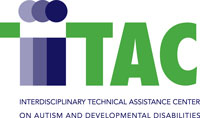February 2, 2015

|
In November 2014, AUCD's Interdisciplinary Technical Assistance Center on Autism and Developmental Disabilities (ITAC) put out a request for proposals to address priority technical assistance needs in Leadership Education in Neurodevelopmental and Related Disabilities (LEND) and Developmental Behavioral Pediatrics (DBP) training programs. The priority areas defined in the request came directly from programs' most recent Non-Competing Continuation progress reports: (1) trainee diversity, (2) technology in training, (3) availability and recruitment of advanced level trainees, and (4) support and inclusion of family trainees and faculty.
A total of 13 programs submitted proposals to address a wide range of needs within the scope of these four areas, and after careful review the five programs that have been selected to receive up to $7,000 in supplemental funding are:
- New Hampshire LEND (Children's Hospital at Dartmouth) is bringing key leaders together to develop and implement a sustainable targeted outreach plan for the recruitment of racially and ethnically diverse family members who have children with developmental disabilities.
- Vanderbilt LEND (Vanderbilt University) is actively building awareness of LEND training among underrepresented minority students who have been accepted to professional schools at three universities, and collaborating with Black fraternities and sororities at multiple campuses to provide activities where undergraduate students can interact with individuals who have neurodevelopmental disabilities through community service opportunities.
- Nebraska LEND (University of Nebraska Medical Center) plans to develop the role and capacity of a current trainee to serve as its new Cultural Diversity Coordinator; the program is engaging an outside consultant for an intensive, multi-day process that will result in an action plan to improve cultural awareness and inclusive recruitment practices within clinical disciplines.
- Virginia LEND (Virginia Commonwealth University) is implementing a series of recruitment and support endeavors to increase the participation of family members of individuals with neurodevelopmental disabilities; the program is engaging current and former Family Mentors as part of this process and identifying leadership opportunities that will assist in preparing Family Trainees for future leadership roles.
- Arizona LEND (University of Arizona) is creating the curriculum and instructional materials for a family and trainee led family seminar and an educational toolbox of supplementary materials in order to increase the amount of support and engagement for Family and Advocate Fellows.
AUCD will provide technical assistance to all of the programs throughout the funding period, which ends in August 2015. Jamie Perry, AUCD's Director of MCH Technical Assistance, hopes that despite the relatively small amount of money and the short time for implementation, saying "These creative initiatives will result in measurable improvements to the programs and the LEND / DBP network as a whole that can be sustained in the years to come."
All five of these programs will be reporting on their process and initial outcomes at the AUCD Annual Meeting in November 2015, and at other occasions upon request.
ITAC is funded through a Cooperative Agreement (Grant # UA5MC11068) with HRSA's Maternal and Child Health Bureau.